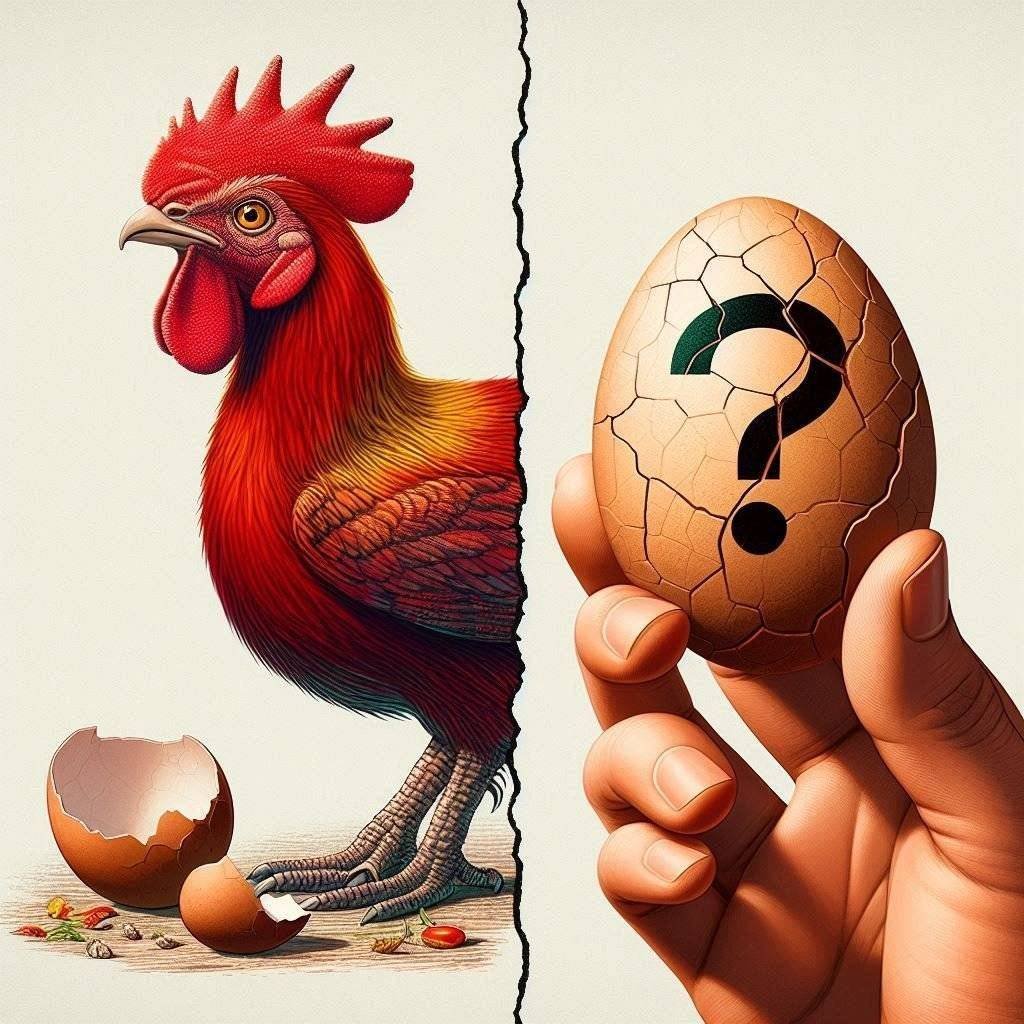Hello, friends! An age-old question that is often asked as a riddle: Which came first, the chicken or the egg? If you say chicken, the question arises, which egg did the first chicken hatch from? If the egg comes first, who gets the credit? The chicken that laid it… or its not-hen mother? And perhaps, the most controversial question about eggs is whether eggs are vegetarian or non-vegetarian? Let’s try to find the answer of these questions in this article.
Table of Contents
The Evolutionary Timeline
About 150 million years ago, when the earth was ruled by dinosaurs, small dinosaurs, big dinosaurs, dinosaurs that ran, and dinosaurs that flew. This was the time when, due to evolution, some dinosaurs started getting smaller and birds began to evolve. The first birds evolved around this time. Evolution doesn’t happen in a linear direction. It can happen in any direction, wherever it fits. Some dinosaurs evolved into scarier dinosaurs like T-Rex, and some dinosaurs got smaller and evolved into birds.
This is why it is said that the common chicken today and the dinosaur T-Rex had a common ancestor. In fact, the T-Rex’s closest living relatives are present-day chickens and ostriches. Look at an ostrich closely sometime; they give off a lot of dinosaur vibes because of this. And all dinosaurs used to lay eggs like these ostriches and chickens. Even before birds evolved, dinosaurs laid eggs.
Early Egg-Laying Creatures
Among animals, the art of laying eggs is ancient. 375 million years ago, when the animal named Tiktaalik Roseae came out of the water and started living on land, it laid eggs too. But the eggs laid by it did not look like today’s chicken eggs. Think of the eggs laid by fish—they do not have an outer shell. This animal must have laid some similar eggs.
So, if we talk about chicken eggs, which have a hard outer membrane and a shell, their evolution took place around 300 million years ago. And if we compare these eggs with a chicken, then the evolution of chickens took place only 3,500 years ago. You heard it right, around 1500 BC, in Southeast Asia, people started farming rice and millet. A large quantity of grains were grown, which attracted a wild animal living in the nearby jungle. This animal was a wild red jungle fowl, which looks very similar to a chicken but lived in the jungles of Southeast Asia.
The Red Jungle Fowl
When humans started farming, it started living near the farms because of the grains. Around this time, humans began domesticating it. Due to this domestication, it evolved through thousands of years into today’s chicken. This species of jungle fowl is still alive and can be found in the jungles of Southeast Asia. But if you compare it to a common chicken, you will see some differences. The wild red jungle fowl is called Gallus Gallus, while its domesticated cousin, the common chicken, is known as Gallus Gallus Domesticus.
The Chicken’s Evolution
So one thing is clear here: eggs are 300 million years old, and chickens are 3,500 years old. So eggs evolved much earlier than chickens. But you will say that the 300 million-year-old eggs were not laid by chickens. So, the next question is, did the chicken come first, or did the chicken’s egg? If you want to guess the answer to this question, you can pause and write it in the comments. It’s not difficult to get to the answer if you understand the stages of evolution.
Chicken evolved from wild red jungle fowl. This wild red jungle fowl must have evolved from another animal, which we can call a proto-chicken, the ancestors of the chicken. So, there must have been a point in time when two proto-chickens mated. Genetic mutations during breeding result in an egg that hatches the first true red jungle fowl. In the same way, the first chicken must have been born. The combination of two proto-chickens’ DNA created the first true chicken DNA. This evolution process occurs only during reproduction. It is only after this that the true chicken would have laid more eggs, giving birth to more chickens. So, the answer to this question is very clear: the egg came first. And this egg was not laid by a chicken but by an ancestor species of a chicken, which was almost like a chicken.
Artificial Selection
Overall, I want to say that it’s not like there was a day in history when the first chicken was born. As if, on 3rd December 1500 BC, two jungle fowls mated and laid an egg, and that egg contained the first chicken. Evolution is not like that. This process is gradual, stage by stage, generation by generation. Later in the video, when I tell you about artificial selection, you will understand better.
Before that, let’s know whether an egg is vegetarian or non-vegetarian. Some people will think that the answer is obvious. Eggs contain life. A baby hatches from the egg. So, obviously, the egg is non-vegetarian. But the thing is, friends, eggs are of two types. Haploid eggs are unfertilized eggs, which contain only female sex cells. These eggs can never produce a baby. The other type is diploid eggs, which are produced after mating. Here, male cells fertilize female sex cells, and babies hatch from these eggs. We often associate this process of fertilization with reproduction.
Are Eggs Vegetarian?
Do you know that there are many plants and animal species that can reproduce without fertilization too? 99% of the eggs we eat are unfertilized, meaning they contain only female sex cells. They can never produce a baby. So, you can call it a protein-rich cell, just like milk. In fact, some people even call eggs vegetarian.
Nutritional Value of Eggs
There are many vitamins and minerals in eggs. That’s why, at one point, the American government ran a campaign to convince people to eat more eggs. They created posters saying, “Keep each shell fresh and tender.” The European government did the same. If you were born in the 70s or 80s, you would remember a slogan saying, “Go to work on an egg.”
But when it comes to eggs, there is one more question: Are brown eggs healthier or white eggs? Actually, this debate has been going on for a long time. There’s a common misconception that brown eggs are the nutritional superstars of the egg world. However, they are not wrong. Brown eggs have a slightly thicker shell and contain more Omega-3 fatty acids. However, this difference is negligible. You can say that they are almost identical in terms of nutritional value. But brown eggs are often more expensive than white eggs. This is because chickens that lay brown eggs tend to be larger and thus require more food.
Brown vs. White Eggs
Just like milk is produced by cows and buffaloes, eggs are produced by hens. But the egg we eat is not fertilized. It contains a protein called albumin and yolk, which is the yellow part in the center. A hard outer shell, composed primarily of calcium carbonate, protects the developing chick within the egg. The difference between brown and white eggs is because they are laid by different breeds of chickens. Chickens that lay brown eggs are bigger and consume more food, which is why brown eggs are more expensive than white eggs. In terms of taste and nutritional value, there is no significant difference between the two.
Increased Egg Production
You will be surprised to know that a red jungle fowl used to lay only 12-15 eggs in a year. But after the domestication of chickens, today a chicken can lay 300 eggs in a year. In the last 3,500 years, chickens have evolved so much that, compared to their wild ancestors, they lay 20 times more eggs. This happened because of artificial selection.
Artificial selection is the opposite of natural selection. This happens when humans breed animals or plants for specific traits. Let’s say there is a chicken that lays more eggs. If humans mate that chicken with another chicken that lays more eggs, the offspring will lay even more eggs. This process is repeated over many generations. In this way, a breed of chicken is produced that lays more eggs. This is called artificial selection.
Artificial Selection in Plants
Just like animals, humans have been practicing artificial selection with plants as well. Have you ever thought about bananas? What were bananas like 3,500 years ago? In the past, bananas had big seeds inside them, and they were not as sweet as today’s bananas. They evolved into the bananas we eat today. Similarly, wild mustard plants have evolved into vegetables like broccoli, cauliflower, and cabbage through artificial selection.
Natural vs. Unnatural
There is an ongoing debate about what is natural and what is unnatural. If you think about it, humans have been influencing nature for thousands of years through artificial selection. But the argument arises when modern techniques like genetic modification come into play. Are they an extension of artificial selection or something entirely different?
Author Yuval Noah Harari, in his book “Sapiens,” mentions that wheat domesticated humans rather than humans domesticating wheat. He explains that humans started farming wheat, leading to the growth of large civilizations. This relationship changed human history forever.
Conclusion
To sum up, the egg came first before the chicken in evolutionary terms. Evolution unfolds through a series of subtle, incremental changes that accumulate over vast stretches of time. Humans have played a significant role in shaping the traits of many animals and plants through artificial selection. Eggs are an essential part of our diet, and their nutritional benefits are undeniable. Whether you prefer brown or white eggs, their nutritional content is almost the same.
FAQs
- Why is the egg considered vegetarian?
- Most eggs we consume are unfertilized, containing only female sex cells. These eggs cannot produce a baby and are considered vegetarian.
- How did the first chicken come into existence?
- The first true chicken was born from an egg laid by proto-chickens. Genetic mutations during reproduction led to the evolution of the first true chicken.
- What is artificial selection?
- Artificial selection is a process where humans breed animals or plants for specific traits, leading to the development of desired characteristics over generations.
- Are brown eggs healthier than white eggs?
- Brown eggs and white eggs are almost identical in terms of nutritional value. The difference in color is due to the breed of the chicken.
- What are the nutritional benefits of eggs?
- Eggs are rich in vitamins, minerals, and proteins. They are an excellent source of nutrition and have been promoted for their health benefits.



